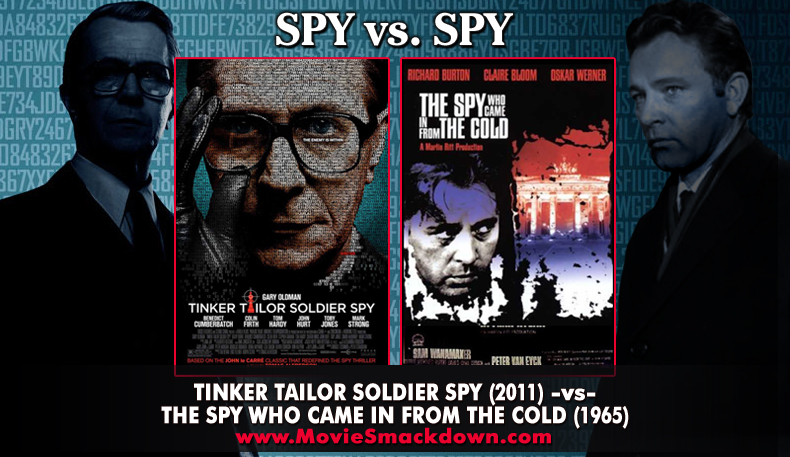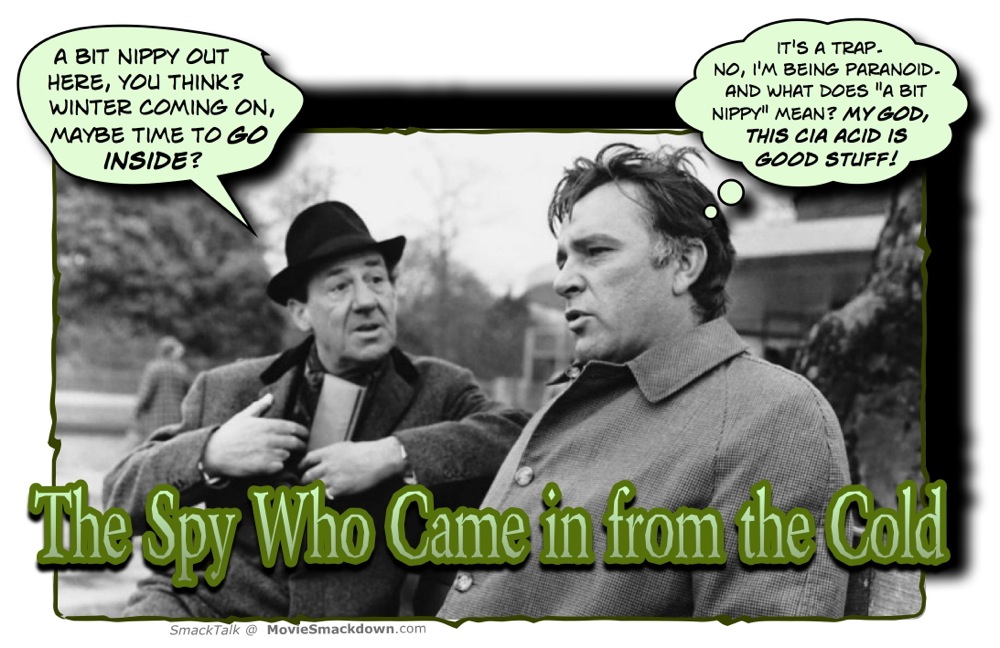
The Smackdown
This is not only a spy vs. spy, top-secret Smackdown, it’s a battle pitting a storied author against himself. John Le Carre’s compelling, plot-heavy novels have consistently provided raw material for movies since the mid-1960s, and if the budget of the latest adaptation, Tinker Tailor Soldier Spy, is any indication, that trend is likely to continue for longer than the duration of the Cold War.
In this battle, the author will shadow-box in the far-flung corners of the espionage world as we pit Tinker Tailor against Le Carre’s first big-screen adaptation, The Spy Who Came in From the Cold.
 The Challenger
The Challenger
It’s the mid-1970s and Great Britain is in the bleak depths of the Cold War. Veteran operative George Smiley (Gary Oldman) ends up in the depths as well, after being ignominiously fired from his job as one of the top spymasters at the Circus (a euphemism for Britain’s Secret Service). George is sacked because of his close association with the Circus’ number-one, known only as Control (John Hurt). Following a mission hand-crafted by Control that goes disastrously wrong, the boss and his lieutenant are given the pink slip. The point of the mission was to confirm Control’s suspicion of a mole operating at the highest ranks of the organization.
Although Control’s suspicion is generally dismissed as paranoid fantasy, the government is nonetheless concerned enough to hire Smiley, on the sly, to investigate it. Slowly and patiently, Smiley digs and hunts. Control had narrowed his suspects down to five of the Circus’s key officers, a list which includes even Smiley himself. Using limited resources and operating outside of the espionage mainstream, our man must establish whether or not the mole story is accurate, and if it is, uncover the guilty party and limit the damage to the Circus’s operations.
 The Defending Champion
The Defending Champion
Le Carre had a soft spot for noble yet disgraced agents; his main character in The Spy Who Came in From the Cold is Alec Leamas (Richard Burton), the administrator of the West Berlin station of the Circus. One night, a would-be defector is shot by Communist border guards for trying to cross the Berlin Wall westward into freedom, and Leamas is blamed for the failure. He returns to Britain and is forcibly retired… but not for long. His being put out to pasture is actually a daring plot forged by Control and Smiley (this time, supporting characters played by Cyril Cusack and Rupert Davies). The idea is that Leamas will pretend to slide into idleness and alcoholism, creating the profile of a bitter ex-operative resentful at his treatment by his masters and prepared to take revenge.
Leamas then defects to the East, ending up, as planned, in East Germany. He’s interrogated by the fanatical and intense Stasi officer Fiedler (Oskar Werner), to whom he gradually “reveals†that he was responsible for running a top-level mole inside the Stasi. This mole could only be the hated Hans-Dieter Mundt (Peter van Eyck), a scary ex-Nazi who has been the bane of the Circus for many years. Fiedler then interrogates Leamas about Mundt, determined to find out whether and how he works for the enemy. The Circus’s plot, of course, is to falsely tag Mundt as a British agent in order to have the Stasi eliminate him.
As you might suspect, complications ensue. Fiedler works it so that Mundt is put on trial, but his only evidence is the fairly unreliable testimony of professional deceiver Leamas. The prosecution’s star witness will have to use his best skills to convince the tribunal that his rival is guilty as charged.
The Scorecard
Tinker Tailor Soldier Spy is a beautifully crafted film that believably recreates gray London during the late Cold War period. The set design of the Circus’s interior is particularly well done, with its capsule-like soundproof meeting rooms among the bureaucratic sprawl. The plot, once famously adapted for a classic, seven-part BBC miniseries, is very thick but for the most part effectively condensed into movie length by director Tomas Alfredson (Let the Right One In), working from an elliptical script by Peter Straughan (The Debt) and the late Bridget O’Connor. Oldman is an offbeat choice for the role of the ultra-reserved Smiley, but he delivers an excellent and realistic performance as a quiet man who works most effectively by fading unnoticed into the background.
While Oldman does an expert job portraying a character, Smiley, whose almost-invisible presence might otherwise barely register, his foils in the film, although played by such BritMovie pros as Colin Firth, Mark Strong and the BBC’s current Sherlock Holmes, Benedict Cumberbatch, aren’t given much screen time and, as a result, we don’t get to know them well. This harms the movie, as Smiley doesn’t have anyone all that interesting to play against.
Tinker’s Soviet spymaster Karla, for instance, is only heard of in anecdotes and briefly glimpsed in a flashback scene—a scene in which it’s hard to buy that such a high-ranking official would be present. Like the mole suspects in that film, Karla fades so far into the background we can barely grasp him.
This is not the case with The Spy Who Came in From the Cold, where we see enough of the chilling Mundt for us to realize that he’s a frightening, powerful adversary. Many other secondary characters in the older film are full-blooded and well realized people who add depth and richness to the story, from the naive young librarian (Claire Bloom) with a fatal attraction to Leamas, to Werner’s determined Fiedler, to even the minor players like Mundt’s smooth lawyer (Czech actor George Voskovec).
Additionally, The Spy Who Came in From the Cold benefits from a leaner story, so less compression is necessary to fit it into movie length. A few plot developments in Tinker Tailor, by contrast, are rushed through or under-developed, which could render it confusing to anyone who hasn’t read the book that it’s based on.
The Decision
Secret wars are usually contentious and tenaciously fought; this one was no different. Although their respective styles and approaches to story are quite different, both Le Carre movies are extremely well done and feature strong central performances. The Spy Who Came in From the Cold nudges ahead, though, thanks to a more cleanly delivered story and better developed secondary characters (courtesy of director Martin Ritt and writers Paul Dehn and Guy Trosper). The Cold War struggle depicted in Tinker, Tailor proved to be, alas, just a little too cold.






Leave a Reply